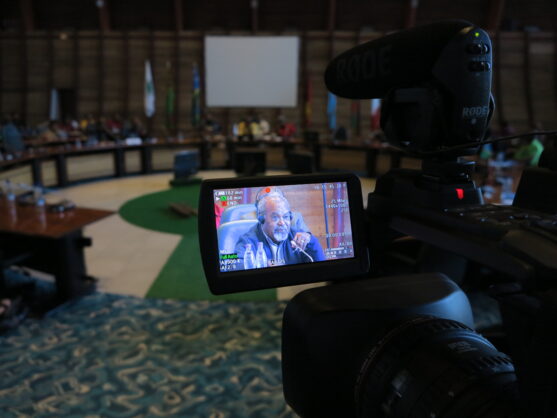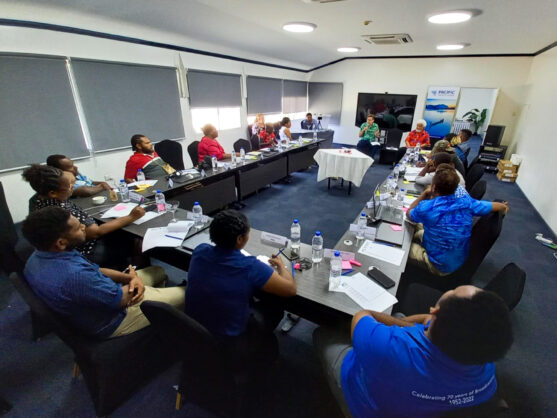Protecting the Pacific’s Information Environment: Pacific Media and Telling the Full Story

Photo by Ben Bohane
Pacific states must ensure that quality reporting and independent media organisations can continue to bring accurate, important stories to communities throughout the region, Steve Sharp writes.
Two apparently unrelated events crystallise the dilemma faced by Pacific media professionals as their institutions bend under the weight of prolonged emergency conditions in health and politics.
One was a plea on World Press Freedom Day this year from the Pacific Freedom Forum. ‘The pandemic has shown [governments] that the media is not their enemy. We need to work together in the fight against ignorance, hate speech and Covid,’ the media advocacy group’s spokesperson said.
The other was a statement by Samoan Prime Minister Tuilaepa Dr Sailele Malielegaoi in September last year, accusing the country’s leading daily, Samoa Observer, of trying to depose the government. The newspaper had months earlier complained of being denied ‘the right to ask questions of the Prime Minister at weekly press conferences and even copies of bills before Parliament’. The same leader is now entangled in a constitutional crisis as he continues to dispute the result in the April general election, in which a rival party won 26 of 51 parliamentary seats.
This anti-media sentiment also surfaced in neighbouring Fiji in 2015, when its prime minister referred to the Fiji Timesnewspaper as “controlled by a cabal that manipulates the news agenda and uses inflammatory language to create disunity, division and instability and to advance its own political interests.”
Pacific journalists are not only facing rising intellectual demands within the region’s shifting political landscape but also a clash of professional and political ideologies. On the one side, a political culture which sees media as a partner to government in promoting agreed national goals; on the other side, a watchdog role that sees national progress emerging from institutional competition where journalists scrutinise power and corruption through their reporting.
Late last month, in their effort to track the unfolding legal stoush at the heart of Samoa’s political crisis, attending regional reporters were turned away by police from the Supreme Court on the pretext of a ‘lockdown’. So much for transparency in the Pacific.
Obstruction and stonewalling of journalists are routine across the islands. They occur elsewhere too, but getting to the bottom of a story is premised on the journalist’s persistent belief in its underlying news value. But this belief alone is insufficient – they must be backed by their editors and properly resourced. Such efforts outside the Pacific islands are commonly better resourced and therefore, have more impact.
If the pandemic has brought into focus the national security risks of allowing misinformation to replicate unchecked, it has not forced a convergence of interests between rulers and messengers. In Fiji, where punitive laws custom-made for media remain, editors and reporters must operate under the Media Industry Development Decree 2010, which had itsorigins in the suspension of constitutional government, public emergency regulations, and rule by military decree.
Fiji’s military claimed the government has “good reason to stifle criticism” and for “curtailing freedom” of the press, but in a pandemic the stakes are higher as citizens need to trust government and a free flow of accurate health information.
The energy, persistence and skills required to pursue complex corruption stories should not be underestimated in any jurisdiction. They are especially exacting within the institutional structures of media-government relations in Papua New Guinea (PNG) and the wider Pacific.
Expanded notions of security – formalised in the 2018 Boe Declaration on Regional Security – are driven by island members pushing back against disempowering characterisations of them as small, fragile and conflict-prone and the promotion of large ocean states with stewardship over the ‘Blue Pacific’.
But what about the Pacific media’s ability and willingness to track these shifting contexts?
Punitive laws and hostile politicians are part of the problem, but equally low institutional status reinforces media incapacity – perpetuated by low pay and high staff turnover. The ‘new Pacific diplomacy’ needs to be underpinned by a new media regionalism where media companies are not only viable and independent but also ensure their reporters are present at major reportable events where they learn on-the-job about security issues. However, recent coverage in PNG is not encouraging.
As the country’s journal of record, PNG’s Post-Courier is tasked with not only identifying significant news events but also explaining to Papua New Guineans why they are significant. PNG has long had a comparatively free and robust press, but its professionalism is called into question when it prints press releases uncritically.
An example of this can be seen in this re-hashed press release printed on 7 June to report the Foreign Minister’s visit to China, seemingly drawn from a Chinese ministry website. Whether the published version was sourced from the PNG foreign minister or the Chinese embassy is not clear. Either way, it simply parrots the public language of a foreign power.
Pacific journalists need to compare notes and maintain a communications infrastructure that serves as an early warning system for impending threats both nationally and regionally. With a fracturing Pacific Islands Forum and degraded media environment, support is needed to keep Pacific media robust, independent, and valued.
New initiatives may be needed at a time of falling advertising revenue, growing misinformation and geopolitical complexity, and other threats undermining the media’s role in providing accurate, analytical reporting. If democracy and the rule of law are to prevail, a free and properly resourced media are essential.
Dr Steve Sharp
Steve runs TME Media & Education Services, a Sydney-based consultancy. He has 30 years’ experience as a journalist, media educator and web publisher in Australia, the Pacific Islands and Asia. He specialises in media development strategy and training and is currently assisting the Pacific Security College develop courses in national security reporting for Pacific journalists.
More Stories

Security Snapshot - 28 Mar 2024
Pacific Security Snapshot | 28 March 2024
Summary ➣ Heavy rains, floods, landslides and earthquakes batter the region ➣ Pacific submissions to the International Court of Justice (ICJ) on climate change responsibility ➣ Elections across the Pacific prompting changes to diplomatic relations and security arrangements ➣ Challenges for women in politics Climate Security Lives have been lost in PNG after a series…

Media Releases - 18 Sep 2023
National Security Reporting Course, Solomon Islands
PSC is pleased to have supported the Media Association of Solomon Islands (MASI) for the delivery of their National Security Reporting Course 2023. Journalists play an important role in updating and educating communities about security issues that affect them. Through effective sourcing and sharing of accurate and reliable information, robust local journalism can help foster…






